|

This is an excerpt from Stalag IIB: The Final Report Unclassified American Prisoners of War in Germany. Prepared by Military
Intelligence Service War Department, 1 November 1945
LOCATION: The camp was situated 1 1/2 miles west of Hammerstein,
(53 degrees 41' North - 16 degrees 58' 30" West) west Prussia on the east side of a highway leading to that city.
STRENGTH: In August 1943 the Stalag was reported as newly
opened to privates of the US ground forces with a strength of 451. The Hammerstein installation acted as a headquarters for
work detachments in the region and seldom housed more than 1/5 of the POWs credited to it. Thus at the end of May 1944, although
the strength was listed as 4807, only 1000 of these were in the enclosure. At its peak in January 1945, the camp strength
was put at 7200 Americans, with some 5315 of these out on 9 major Kommando Companies (work companies) which in turn were subdivided
as follows:
Company Lauenberg - 65 kommandos - 1700 men - MOC/Cpl John Kuntz
Company Stolp - 40 kommandos - 750 men - MOC/Ssgt Jacob G. Schnick
Company Runmielsberg - 28 kommandos - 550 men - MOC/Pfc Paul Sapsara
Company Kosling - 25 kommandos - 450 men - MOC/Sgt Warren Mason
Company Falkengberg - 15 kommandos - 315 men - MOC/Cpl Kenneth
Castor
Company Jastrow - 25 kommandos - 450 men - MOC/Pvt Frank Deluca
Company Dt. Krone - 20 kommandos - 550 men - MOC/1st Sgt Leonard
Fleharty
Company Schlochau - 12 kommandos - 200 men - MOC/Pvt Arnold Trautman
Company New Stettin - 15 kommandos - 350 men - MOC/Pvt Milton
Bartelt
DESCRIPTION: The camp sprawled over 25 acres surrounded by
the usual two barbed-wire fences. Additional fences formed compounds and sub-compounds. Ten thousand Russians lived in the
East Command, while the other nationalities - 16,000 French, 1600 Serbs, 900 Belgians - and the Americans were segregated
by Nationalities in the North Compound. Within the American enclosure were the playing field, workshops and dispensary, showers
& delouser. At times more than 600 men were quartered in each of the 3 single-story barracks. 15 yards wide and 60 yards
long, made available to the Americans. Although this resulted in extremely crowded conditions, it contrasted well with the
Russian barracks which held as many as 1000 POW apiece. Barracks were divided in two by a center washroom which has 20 taps.
Water fit for drinking was available at all hours except during POWs last 2 months when it was turned off for part of the
day. Bunks were the regulation POW triple-decker types with excelsior mattresses and one German blanket (plus 2 from the Red
Cross) for each (man). In the front and rear of each barracks was a urinal to be used only at night. Three stoves furnished
what heat there was for the front half of each barrack, and 2 for the rear half. The fuel ration was always insufficient,
and in December 1944 was cut to its all-time low of 12 kilos of coal per stove per day. On warm days the Germans withheld
part of the fuel ration.
US PERSONNEL: Pvt Harry Galler was Man of Confidence from
August 1943 until July 1944, when the Germans refused to negotiate with him because they had discovered he was Jewish. Pvt
Gallar attributes the German discovery to the activities of a purportedly British POW who called himself Pvt. Leonard B. Cornwall;
but confided that his real name was Leonard B. England. This man was actively anti-Semitic (and) possessed a list of American
POW who were Jews. (He) spoke fluent German and seemed on friendly terms with the German Staff. He was suspected by some POW
of being a German Stool Pigeon; planted in the camp to create dissension.
With the resignation of Pvt. Galler; M/Sgt John M. McMahan became MOC -
a position he held until his escape from a marching column on 13 April 1945. Other members of the permanent camp staff were:
Adjutant - M/Sgt Robert Ehalt
Red Cross Representative - Pfc. Gunnar
Drangsholt
Mail NCO - S/Sgt Edward Voberding
Personal Parcel Distributor - S/Sgt Stephen
Novak
Recreational Supplies - Pvt Henry Wintjen
Educational Department - Sgt John Dixon
and Sgt Estburn Maynor
Protestant Chaplain - Cpl Alfred C. Carroll
and Pvt Bruce Meads
Catholic Representative -Pvt Thomas McGovern
Medical Officers - Capt Wilber McKee
Capt John Moorman
Capt Henry Wynsen
Capt Louis Salerno
Dr. Buls (Belgian)
A Security Committee Also Existed
(editors note: I have moved the MOC's or men
of confidence names for Kommando Companies from here and added them to the previous list above so that it makes more sense)
GERMAN PERSONNEL: Although the German Commandant seemed correct
in his attitude toward American POW, it is unlikely that the extreme severity of his underlings could have existed without
his knowledge and consent.
Commandant - Oberstlieutnant Von Bernuth
Commandant - Oberst Von Keppler
Executive Officer - Oberstlieutnant Segars
Kommando Officer - Hauptmann Springer
Security Officer- Hauptmann Giesel
Medical Officer- Hauptmann Wagner
Chief Censor - Unteroffizier Krause
Lager NCO - Feldwebel Kohler
Kommando NCO - Unteroffizer Wendorf
Of the Germans listed, only the Medical officer was liked by the POW. The
Censor was disliked to an extreme, and POW hated Springer, Wendorf and Kohler, all 3 were described as Nazi fanatics who enjoyed
wreaking hardships on Americans. Springer is held to be responsible for the killing of men on Kommandos.
TREATMENT: Treatment was worse at Stalag IIB than at any other
camp in Germany established for American POW before the Battle of the Bulge. Harshness at the base Stalag degenerated into
brutality and outright murder on some of the Kommandos. Beatings of Americans on Kommandos by their German overseers were
too numerous to list, but records that 10 Americans in work detachments where shot to death by their captors.
In the fall of 1943, when Hauptmann Springer was seeking men for work details,
American NCOs and Medical Corpsmen stated that according to the Geneva Convention they did not have to work unless they volunteered
to do so, and they chose not to volunteer. At this, the German stated that he did not care about the terms of the Geneva Convention
and that he would change the rules to suit himself. Thereupon, he demanded that the POW in question fall into line and give
their names and numbers for Kommando Duty. When the Americans insisted on refusing, Hauptmann Springer ordered a bayonet charge
against them. At the German guards' obvious disinclination to carry out the command, Hauptmann Springer pushed one of the
guards toward an American, with the result that soon all POW were to line up as ordered.
Typical of the circumstance surrounding the shootings are the events connected
with the deaths of PFC Dean Halbert and Pvt. Franklin Reed. On 28 August 1943, these 2 soldiers had been assigned to a Kommando
at Gambin, in the district of Stolp. While working in the fields, they asked permission to leave their posts for the purpose
of relieving themselves. They remained away from their work until the work detachment guard became suspicious and went looking
for them. Sometime later he returned them to the place where they had been working and reported the incident to his superior.
Both of the Kommando Guards were then instructed to escort the Americans to the Kommando barracks. Shortly after they had
departed, several shots were heard by the rest of the Americans on the work detachment. Presently the two guards returned
and reported that both Pfc. Halbert and Pvt Reed had been shot to death for attempting escape. The guards then ordered the
other American POW to carry the bodies to the barracks.
On another Kommando, the Germans shot and killed 2 Americans, stripped them
and placed the bodies in the latrine where they lay for 2 days serving as a warning to other POW.
Eight of the killings took place in the latter months of 1943, one in May
1944 and one in December 1944. In almost every case the reason given by the Germans for the shootings was "attempted escape".
Witnesses, however, contradict the German reports and state that the shootings were not duty; but clear cases of murder.
FOOD: From the Germans, POW received daily 300 grams of coarse
bread and 500 grams of potatoes; twice weekly they received 300 grams of meat and 20 grams of margarine; once a week they
drew 50 grams of cheese; marmalade was issued sporadically. All these rations were found in the midday meal, which was always
in the form of soup. The breakfast consisted of ersatz coffee. There was no supper.
To supplement the meager German diet, POW relied on Red Cross food. From
19 Sept 1943 until 1 November 1944, one parcel per man was issued each week. From 1 November 1944 until 1 January 1945, the
parcel distribution was cut to ~ parcel per man per week because of insufficient stock. During December 1944 and January 1945,
however, carloads of parcels, Christmas parcels included, totaling 101,000 were received. In late January 5 carloads were
received from Stalag Luft 4, Where the Germans said their was no room for them. Later the MOC of Stalag Luft 4 stated that
he had never approved the shipment.
Parcels were stored in the lager reserve in Hammerstein and in the headquarters
of the various Kommando Companies. In the Stalag proper, they were kept with the "Green Post" Compound, between the North
& East camps. Many of the parcels arriving at the railroad station were broken open. Whether this damage was due to rough
handling in transit or to German pilfering could not be determined. On 19 January 1945, 46,000 parcels were on hand. One month
later there were none. The German complement had confiscated 6000, the Wehrmacht 2000, civilians stole 400 and the rest were
given to evacuating Americans and other fleeing nationalities passing through the area. During this period 5 carloads (13,500
parcels) destined either for Stalag 2B or 2D were never received. Their disappearance may be attributed either to German looting
or Allied Air Attacks on trains.
HEALTH: Health was surprisingly good. Aside from minor ailments
such as diarrhea or grippe, the main illnesses were malaria, from which some 100 men suffered and diphtheria, which struck
a maximum of 5 men a month.
Medical supplies in the lazaret were woefully short. POW received no stocks
from the Red Cross until June 1944, when they got a few parcels in response to 2 telegrams sent without knowledge of the Germans.
Pvt Drangsholt, the Red Cross representative in camp, had twice been able to wire Switzerland when on business outside the
Stalag. Within 2 weeks after the first telegram had been sent, medical supplies were flown to camp. Among the most needed
drugs were quinine, atabrine and aspirin. Previous to this time, the Germans had refuse to pass on the American Medical Officer's
requisitions, saying that he did not need the supplies. For example, when he asked for 1000 Phenobarbital tablets, the Germans
would give him 10, saying he now had a supply and would get some more only when his current supply was exhausted. Furthermore,
the Germans disliked sending telegrams to the Red Cross in Switzerland for such telegrams gave the impression, they said,
that the POW were receiving nothing. Yet, at times the Germans gave only 100 atabrine tablets to some 90 men shaking from
malaria and then claimed that the Americans had no right to protest to Geneva about lack of supplies.
Examination of men chosen for Kommandos provided the American Medical Officer
with a great deal of difficulty, for the German idea of a POWs fitness for duty differed substantially from the American.
Capt. McKee tried to hide men who were too sick to go out on work detachments and usually put them in the hospital after falsely
diagnosing their cases as grippe or dysentery. Some men, always unwilling to work, sought excuses to forestall their being
chosen for Kommando duty. The Medical Officer gave these men all the help he could. He did not, however, permit himself to
aid malingerers to the point where it would jeopardize those who were actually sick. Ear, eye, nose, throat, mental, venereal
and similar serious cases were sent from Stalag IIB to other hospitals. But POW on Kommando sometimes suffered from lack of
medication and proper treatment.
One 48 hole latrine, with adequate urinal space, served as many as 1800
POW during the daytime. Since they lacked equipment for many months, POW found it difficult to keep the latrine clean. Twice
a day a detail washed it down with hot water.
Bathing facilities were satisfactory. A POW could take 3 hot showers a week.
The shower building was open 8 hours a day and contained some 80 shower heads. Men were deloused periodically.

April 3, 1944
Dear Cassie:
Just a few lines to let you know that I received
your card and how glad I was to hear about Dutch. I’m so glad for you Cass. I had a feeling that everything
would turn out alright. In a way it is tough that he is a prisoner, but they are treated alright and all you have to
do now is wait.
It is going to be a pretty long war and I know
you will become weary at times but I know you will see it thru. There is always the chance that he might be traded back
and that is just a chance.
At least you know that he is alright and nothing
will happen to him. You know that he will come back to you when this is all over. Keep that chin up Cass and I
know everything will turn out alright. I was glad that you thought of me and told me right away. You’ll
never know how happy I was to get that card from you.
Give my best regards to everyone and write
again sometime if you care to.
Your Friend Always,
Red Brooks

Undated
Estimated April 4, 1944
[Illegible] pretty good so far and I'm in the
best of health, I hope you haven't been worrying about me to much. We are allowed to write 2 letters and two cards
a month, so you have to do most of the writing. If you send me a box, put candy and cigarettes in it and also
plenty of toilet articles the red cross [Ilegible]

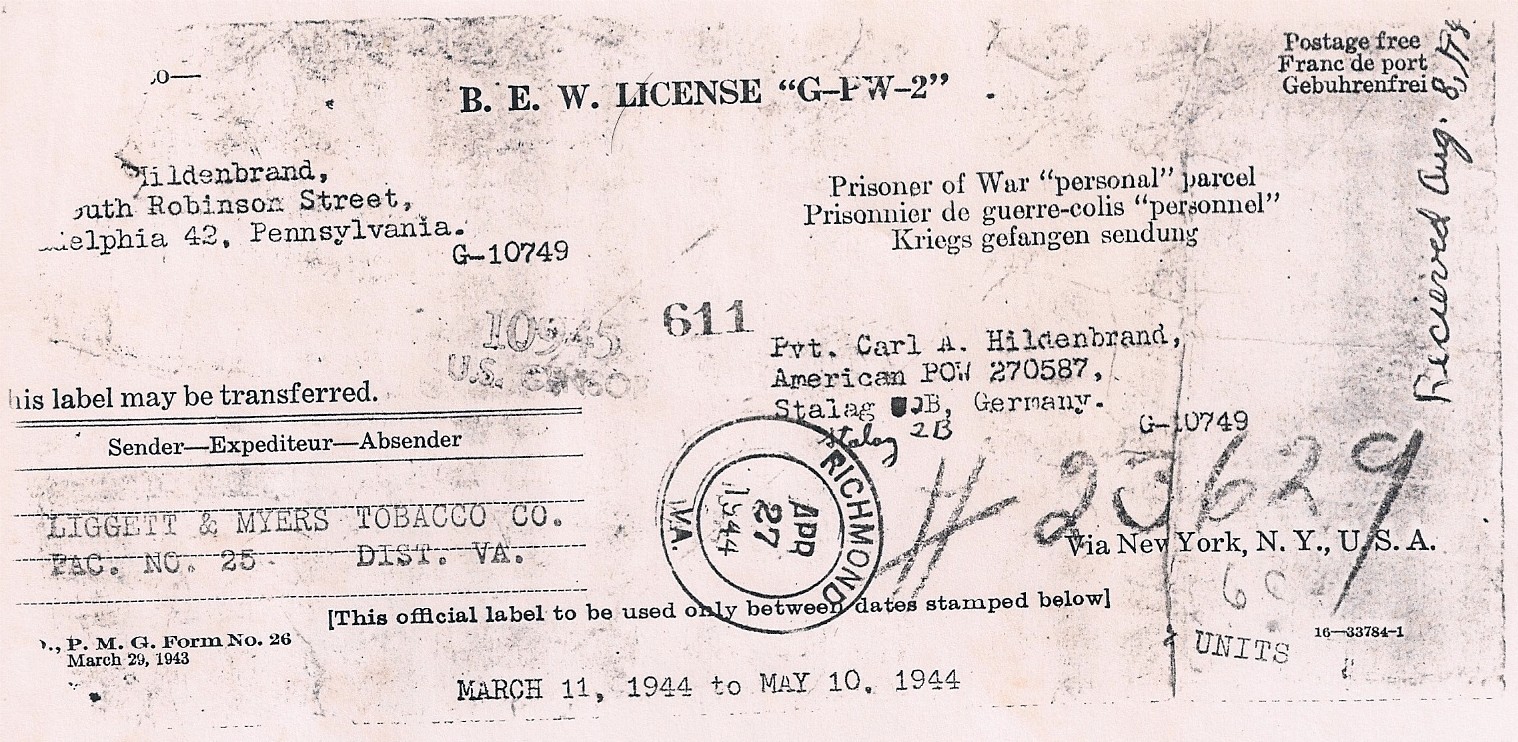
Note from WOLF -- American cigarettes via the Red Cross
packages made for superior trading with the Germans.

Undated
Estimated April 15, 1944
[Illegible] myself except that I'm becoming to be
quite a chess player . I'm not working yet, so I have quite a lot of time playing chess and read. Give my love to the
babies and take care of yourself as I love you very much.
Carl

This is an excerpt from Stalag IIB: The Final Report Unclassified American Prisoners of War in Germany. Prepared by Military
Intelligence Service War Department, 1 November 1945
RECREATION: In 1943 and the spring of 1944, POW were locked
up in their compound and could only walk in a 50'x50' yard space in the rear of the 3 barracks occupied by Americans. In the
summer of 1944, after one year in camp, Americans were given access to an athletic field situated in the center of the camp
between barracks #8 and #10. Football, softball, basketball, and volleyball could be played on this field simultaneously.
Most equipment came from the YMCA and some came from the Germans. The softball field could be used at any time in the evening
after 1700 hours; the football field, volleyball and basketball courts were shared with POW of other nationalities.
By November 1944 some 8000 books had been received from the YMCA, Red Cross
and European Student Relief Fund. Sgt Eastburn Maynor was in charge of the Library which could be visited any time during
the day or evening. A reference library of 2500 books was maintained in addition to the 8000 volumes already mentioned.
A theater built by the French was shared by all. Several original musical
comedies were produced by Americans, and since the theater seated only 300 men, 5 separate performances had to be given to
assure each POW of an opportunity to attend. At times the band and theater group; under guard, were permitted to give performances
for the benefit of work detachments. The band numbered 18 pieces; all instruments were supplied by the (YMCA) or Special Services,
US Army.
Once 3 groups totaling 1500 Americans were escorted to motion pictures in
Hammerstein - a privilege accorded POW of other nationalities. The Americans spruced up and wore class (A) uniforms putting
German officers and soldiers, who were untidy, to shame. This was resented by German civilians and Americans wer not taken
again to the movies in Hammerstein.

Postmarked April 27, 1944
Dearest Cass,
I hope everything is alright with you and
the babies, as I worry about you and think of you every minute of the day. I hope that when you write to me, that you
will also send me some pictures of yourself and the babies. How is everyone at home? Give my regards to everyone
and tell them not to worry about me as I’m in the best of health. There isn’t much that I can tell you about
myself, except that I play a great deal of softball and also read a lot. Don’t worry about me as everything is
alright. I sure miss you and the babies, so take care of yourself. As I love you more than anything in the world.
Don’t forget to send me those pictures as I am looking forward to them. Give my love to the babies.
Carl

This is an excerpt from Stalag IIB: The Final Report Unclassified American Prisoners of War in Germany. Prepared by Military
Intelligence Service War Department, 1 November 1945
WELFARE: All POW felt extremely grateful to the Red Cross
for delivering food, clothing and medical supplies. Had it not been for the Red Cross, states the MOC, many more men would
have died.
The Protecting Power Representative visited the camp quarterly and investigated
all complaints. Although the visits did not accomplish much, it was felt that the representative had the interests of the
POW at heart and did as much as he could for them. The Mary 1944 visit differed from the other in that it seemed to accomplish
better results. Kommando killings ceased, except for one in December 1944, but whether this was because of the Protecting
Power or coincidence is not known.
The YMCA provided POW with sports equipment, books and musical instruments
enough to earn the gratitude of the many men who availed themselves of recreational opportunities.

Postmarked
May 15, 1944
Dearest Cass,
How’s everything with you and the
babies. I first got finished writing a card to my father and mother. As yet, I didn’t receive any word from
you, but I hope to soon. As yet I haven’t been working just sitting around reading and playing a little baseball.
How’s everything with your father and mother? Give your Aunt Emma and Grandmother my regards and tell them I’m
doing alright. How are the babies coming along, I sure wish I could see them. I hope you are taking care of yourself
and the babies, as I expect to see the best looking wife and daughters a man could have when I get back. Don’t
forget to send some pictures as I’m looking forward to them. I love you and think of your always.
Carl

NOTE FROM WOLF: Note that in below letter, Dutch is asking about his brother
Eric, who was killed in November 1943. Obviously, he did not yet know that his brother had been killed in action.

Postmarked May 18, 1944
Dear Cass,
I wrote my last letter, so I won’t
have very much to write about. I ought to hear from you soon and I’m hoping everything is all right with you and
the babies. How is my father and mother? Is Herby still working and how is Rudy and Eric doing. Write and
tell me everything as I’m anxious to how everybody is. Everything is all right on my end, so don’t worry
about me. By the way, “how is Jimmy doing?” Give everyone my regards and tell them to write.
I almost forgot about Richard. How is he? Well writing space is short, so I better write what I’m thinking
about every day. Honey, I love you and miss you and the babies very much, so take care of yourself.
Love,
Carl

Postcard
May 28, 1944
Dearest Cass,
How’s everything with you and the
babies? Everythings all right at this end except that I’m longing to be with you. I didn’t get any
letters yet, but expect some anyday. How's everybody at home? Give my love to the babies and send me some pictures
of them and yourself.
Carl

Undated
Estimated June 7, 1944
How's everything
with you and the babies? Some of the fellows that I was captured with have been getting some mail. So I'm wondering
if you sent yours by air mail. Everything is alright at this end, so dont worry about me. We had some log books issued to
us last week so I spend most of my time drawing and writing in it. I met a fellow from Philly here and he says he
knows Ellenor Magee. His name is Bill Blair and his address is 819 Bucknell St.and his sster used to work at McCorry's
5&10 at 10th & Market and they called her Sis Blair. [illegible]

This is an excerpt from Stalag IIB: The Final Report Unclassified American Prisoners of War in Germany. Prepared by Military
Intelligence Service War Department, 1 November 1945
MAIL: Each POW was furnished with 2 letter forms and 4 cards
per month except for a few months when a shortage reputedly caused by bombing, cut the issue in half. Medical orderlies received
double allotments. Forms were net withheld as punishment. Surface mail to the USA, averaged 3 1/2 months in transit; airmail,
6 weeks. Only a spot-check censorship was made by the American staff.
The number of incoming letters was unlimited and POW could retain such mail
indefinitely. Surface mail from the USA took 4 months to reach camp; airmail, 5 weeks. All letters were censored at the Stalag
by Wehrmacht personnel, civilians and SS troops. As a rule, censorship was sloppy. Once a week incoming mail was delivered
to Kommandos and outgoing mail picked up and brought to the camp for censoring and dispatch. Communication between the men
at the Stalag and those on Kommando was permitted.
Personal parcels generally arrived in good condition about 4 months after
being mailed. Some of these parcels, like a few of the letters, were censored in Berlin. Most, however were censored at Stalag
IIB, where an American always witnessed the censoring. German guards on work detachments made a habit of stealing cigarettes
from personal parcels, and at the base camp 90,000 Old Gold & Raleigh cigarettes were confiscated because their packages
bore the slogan, "For Victory - Buy War Bonds."

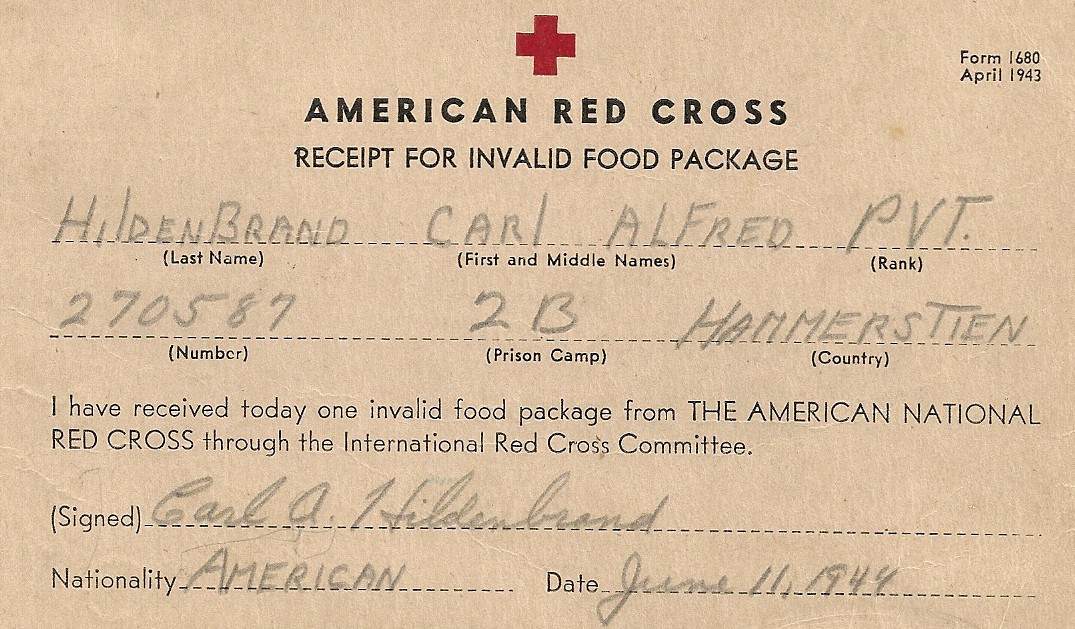
Postcard
June 11, 1944
Dearest Cass,
How’s everything with you and the
babies? I had a picture drawing of you in my log book and its very good. I’ll show it to you when I get
back home. There isn’t much to write about myself except that I’m well and not working yet. Be good
and take care of yourself and the babies.
Love,
Carl

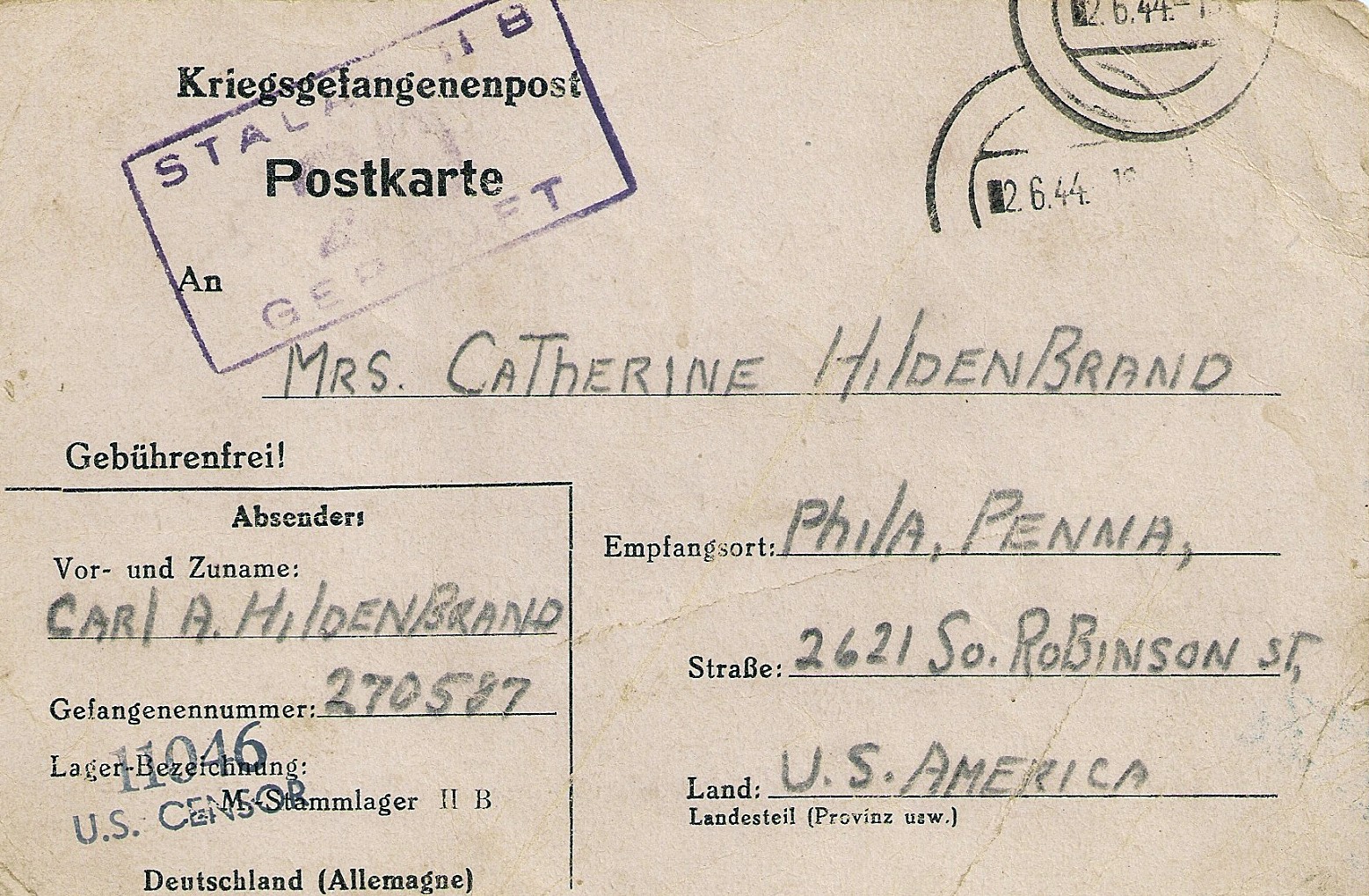
Postmarked June 22, 1944
Dearest Cass,
You and the babies? I still haven’t
received any letters from you, so that leaves me kind of worrying about you and the babies. I haven’t very much
to say about myself, except that I’m well and not working yet. I received a wooden suit case from the Y.M.C.A.
and in it it had a pair of trunks and a new testament and a few other things. You needn’t worry about sending
me any clothes, as I have more than I can use right now. The Red Cross is sure doing a good job over here and I’m
mighty thankful to it. Don’t forget to send me some pictures, as I’m pretty anxious to see how you and the
babies are looking. Well that’s all I can think of right now, so take care of yourself and the babies as I want
to see a good looking family when I get back home.
Love to all,
Carl

This is an excerpt from Stalag IIB: The Final Report Unclassified American Prisoners of War in Germany. Prepared by Military
Intelligence Service War Department, 1 November 1945
CLOTHING: The clothing situation was always
a source of contention. The Germans insisted that they had the right to keep a man's old clothing when he was re-outfitted
with Red Cross supplies. This made it necessary for POW to work in rain and mud in their one and only uniform. Eventually
the Protecting Power did see that POW were allowed to keep their old clothes.
As in other camps, the Germans never pretended to supply enough
clothes and when they were called upon to furnish garments; issued wooden shoes, rag like socks, undershirts spun from processed
wood and old overcoats infested with bugs. The Red Cross provided enough of all items except shoes, overcoats, socks, gloves
& blankets. The Germans had enough blankets in camp to issue 2 per POW but instead sent them to Volkssturm toops digging
trenches in the vicinity.
In December 1944 the camp received from the Red Cross a shipment
of 2380 American Uniforms badly needed by 1100 new arrivals. The Germans broke all precedence by demanding that the uniforms
be yielded to them and subsequently seized them by force. French POW under German guard loaded trucks which were driven out
of camp. Although PE received a receipt for the clothing, they never got a satisfactory explanation. The MOC complained to
the Commandant 3 times and was told the confiscation order came from the Red Cross. The Protecting Power denied knowledge
of any such order and promised an investigation.

Little Kathleen standing in front; Carol (infant) third from left. Pop Rush's neighborhood gang.
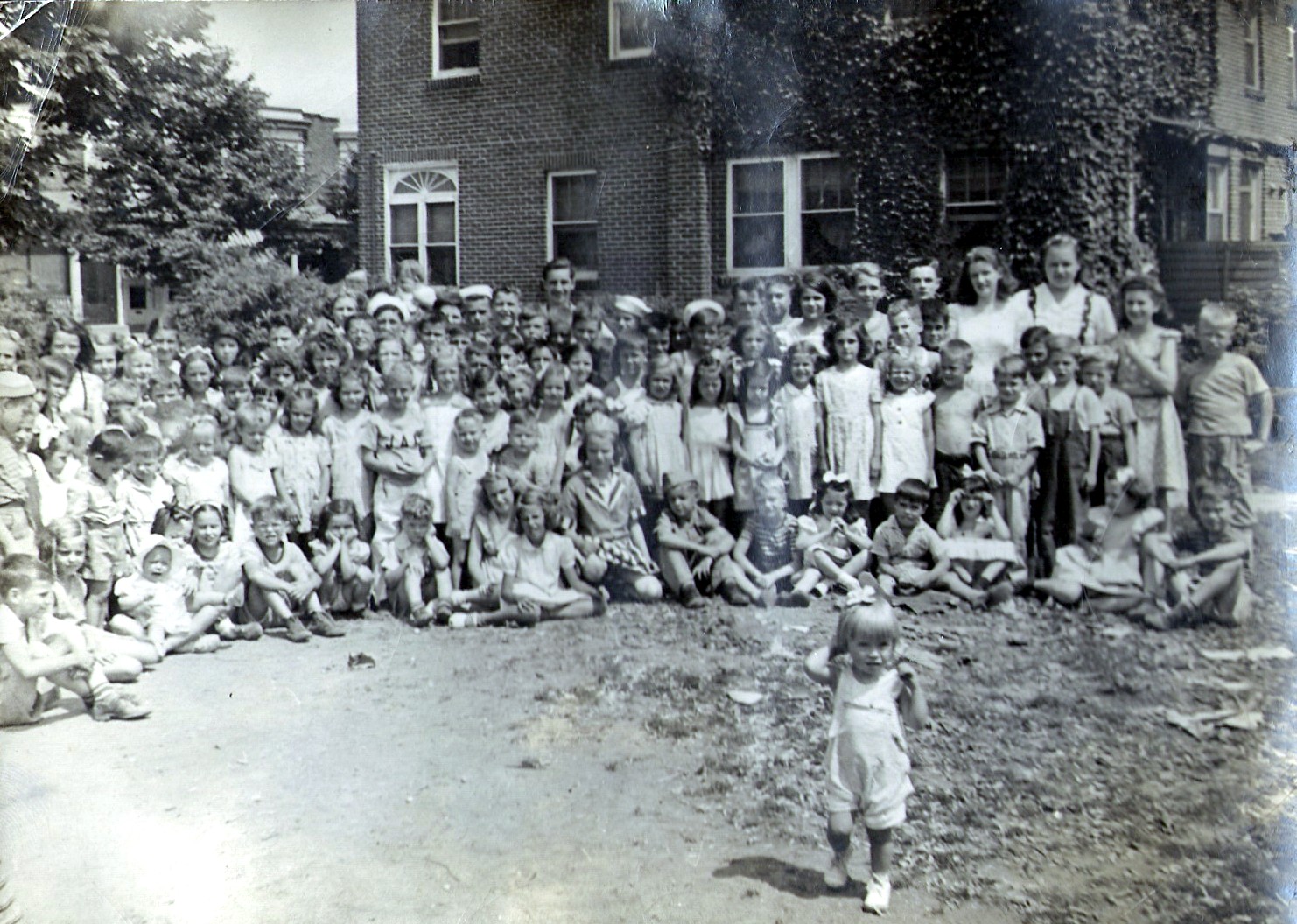
Postcard
June 24, 1944
Dearest Cass,
Just a few lines to let you know that everything
is alright. I don’t know what’s happening at home and I haven’t heard from you yet so I’m hoping
everything is alright with you and the babies. Give my love to the babies and keep your chin up.
Love,
Carl

Postcard
July 2, 1944
Dearest Cass,
As I sit here writing this card, I have
but one thought and that is of our wedding anniversary. I want to tell you how much love and happiness you have given
me in our years of marriage and I hope you feel the same. Give my love to the babies and take care of yourself.
Love,
Carl

Undated
Estimated Date August 1, 1944
[Illegible] lot of ladies whose boy's are in my
camp. Dont forget to write me their names and addresses. Dont worry about me as everything is alright
at this end. Just take good care of yourself and the Babies till I get back home. Love to you and the babies.
Carl

Undated
Estimated Date July 15, 1944
[Illegible] My mouth is watering for some candy.
I sure wish I had some pictures of you and the babies, so dont forget to see if you can send me some. Take care of yourself
and the babies and don't worry about me as everything is swell and I'm feeling fine.
Carl

Undated
Estimated Date August 1, 1944
[Illegible} lot of Ladies whose boy's are in my Camp.
Dont forget to write me their names and addresses. Dont worry about me as everything is alright at this end, Just
take good care of yourself and the babies till i get back home,
Love to you and the babies
Carl

Postmarked August 14, 1944
August 1944
Dearest Cass,
I’m getting mail from home pretty
regular and it sure makes one feel a lot better. You mentioned in your letters that you were sending me some pictures
of yourself and the babies, so I hope they get here soon as I can hardly wait till I see them. You asked me if I know
a Larry Glynne from Maryland, off hand I can’t say that I do. Why do you ask? I got a letter from my mother
and she told me that Herby was in the service, I haven’t very much to say about myself, except that I’m well and
in the best of health. I’m still reading a book a day and if it was not for the books, I’d go crazy;
Give everyone my wishes and take care of yourself and the babies, as I love you all more than anything in the world.
Love,
Carl

August 17, 1944
Dear Cassie:
Thank you for the lovely letter, I wanted to
hear from you more than anyone else as you and I seem to undergo the same experience. I am sorry I couldn’t write
sooner but I have had so many letters to answer.
How is Dutch, I hope he is well, I wish and
pray that Bob might be a prisoner, I understand the Germans treat the prisoners of war, very much the same as we do.
How long was Dutch missing when you were notified he was a prisoner?
I received a letter last month from the War
Dept., stating that the plane in which Bob was flying was seen falling to earth, parachutes were also seen but it is not known
whether they were from his plane, I am praying that he might have been one of those chutists and landed safely. He couldve
been safe as all this happened over Berlin, May 24th and I believe it was Bob’s first mission.
I was planning on walking down and seeing you
and your babies, but the weather has been so hot, and I am expecting another child.
Well Cass if you can come over at any time
I certainly will be glad to see you. I shall close now as I have to write a letter to my baby brother who is now in
France.
Love,
Ruth Carberry Brooks

Postcard
August 27, 1944
Dearest Cass,
I’m receiving mail quit often now
and it makes me feel a lot better hearing from you. I received the pictures that you sent me in April and they sure
are good of the babies and you. I also received the cigarettes that you sent and they sure came in handy. I love
you and miss you all.
Carl

Postcard
September 10, 1944
Dearest Cass,
Everything is fine so far and I received
the photograph that you sent me of yourself. It sure was a beautiful photograph of yourself and I was very proud to
show it to all of the fellows. I had a fellow POW draw a copy from it in colors and it came out beautiful.
Loving you always, Carl

Undated
Estimated Date September 17, 1944
[Illegible] be soon. Last week I had a picture
taken of myself and five other fellows . I'll send one to you as soon i get them . In your last letter you asked me how much
I weighed. Well- [illegible].

September 18, 1944
Dear Cass
Last week got a lot of birthday cards, one was
from my parents, another from Grace and the two that you sent me. I was glad to receive them especially the one you
sent me. Everything is fine so far and hope that everyone is well at home. In your letters to asked me if I was
working on a farm yet. Well, as yet I'n not but I might [illegible]

Postcard
September 23, 1944
Dearest Cass,
I haven’t got the picture I had taken
the other week yet, but I’ll send it to you as soon as I do. Everything is alright here and I hope it is the same
at home. I worry about you constantly, so take care of yourself and the babies as I love you all very much.
Love, Carl

This is an excerpt from Stalag IIB: The Final Report Unclassified American Prisoners of War in Germany. Prepared by Military
Intelligence Service War Department, 1 November 1945
MORALE: Morale of the Americans as a group was exceptionally high. They were always "cocky".
All propaganda efforts by the Germans were ineffective and paradoxically lifted the morale of POW who had schooled themselves
to believe the exact opposite of what they recognized as German propaganda. Discipline was good, with only a few POW causing
trouble. POW were largely satisfied with their American camp Staff which saw that they were regularly fed and adequately clothed.
Only during the period of the evacuation march when POW encountered wretched quarters and lack of food did morale dip.
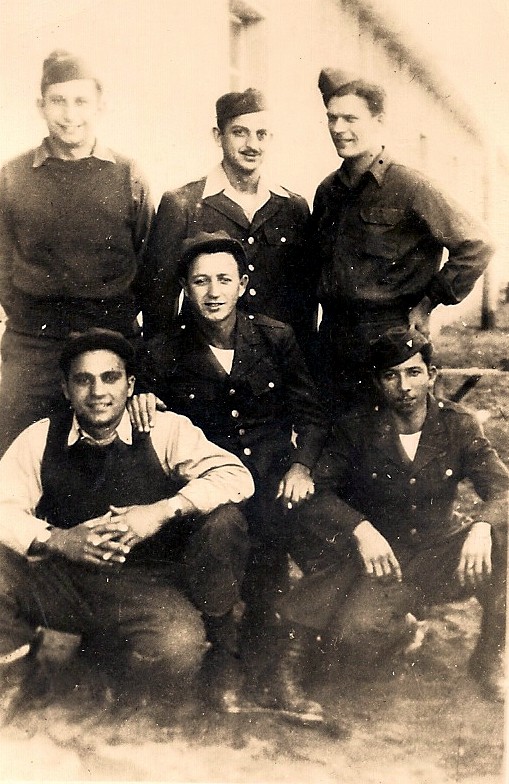
Note from WOLF -- The above photo
was taken at Stalag IIIB. One of the prisoners in the photo is reportedly from the Philadelphia area, according to other
letters from Dutch, Dutch is top row, far right. Below is the stamp on the back of the above photo.
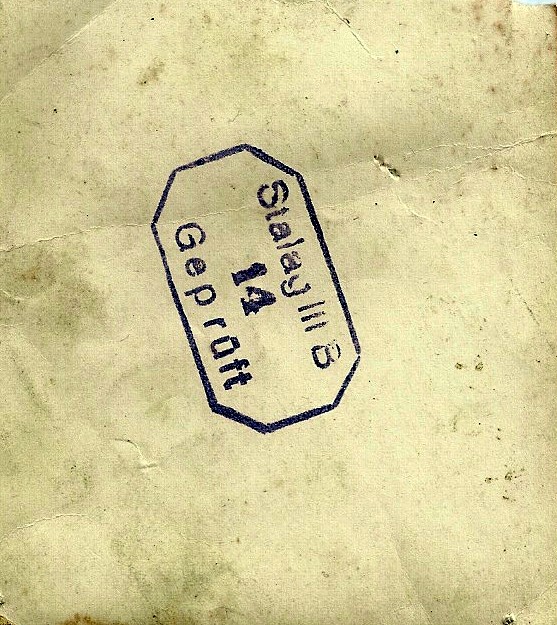
This is an excerpt from Stalag IIB: The Final Report Unclassified American Prisoners of War in Germany. Prepared by Military
Intelligence Service War Department, 1 November 1945
RELIGION: The Chaplaincy in Stalag IIB was initiated by Pvt.
Bruce Meads who arrived in August 1943. When his health broke down in February 1944, leading to his eventual repatriation,
he was succeeded by Cpl Alfred C. Carroll. At first regularly scheduled chapel services were held in any available barracks
space. Later permission was granted worshippers to leave the American Compound and use the French Chapel. With the consent
of the abwehr Officer, Pvt Meads began the practice of visiting one Kommando each Sunday. Subsequently his assistants visited
as many as 4 Kommandos per Sunday.
Catholics attended regular Masses celebrated by a French Priest. He and
his assistant Pvt Thomas McGovern, visited working parties twice monthly. Aside from the services conducted by these representatives,
no organized religious activities for Kommandos existed.

Postcard
October 8, 1944
Dearest Cass,
I am writing this card from a farm, as I
was drafted the other day. Right before I left the Stalag I received a food parcel from you and it was a very nice box.
I will write you more later, when I get my letter form.
Love,
Carl

This is an excerpt from Stalag IIB: The Final Report Unclassified American Prisoners of War in Germany. Prepared by Military
Intelligence Service War Department, 1 November 1945
WORK: Except for housekeeping chores benefiting
POW, no work was performed in the Stalag. All men fit to work were set out to Kommandos where conditions approximated the
following:
A group of 29 Americans were taken under guard to a huge farm 6
kilometers from Stolp, where 12 French POW were already working without guards. Americans were billeted in a section of a
large brick-floored barn. Adjoining sections were occupied by pigs, cows & grain. POW slept on double-decker bunks under
2 blankets. The French had a small building of their own. Guards lived in a small room opening onto the Americans' quarters.
Each day the men rose at 0600 and breakfasted on Red Cross food
and on potato soup, bread and hot water (for coffee) which they drew from the farm kitchen. At 0630 they washed their spoons
and enameled bowls and cleaned their "barracks". They shaved and washed themselves in 3 large wash pans filled from a single
spigot which gave only cold water. The outdoor latrine was a 3-seater.
At 0700 they rode out to potato fields in horse-drawn wagons driven
by coldly hostile German farmhands who would welcome the opportunity to shoot a "kriege."
Under the watchful , armed guards the dug potatoes until 11:30
when they rode back to the farm for the noon meal. This consisted of Red Cross food supplemented by German vegetable soup.
Boarding the wagons at 1300, POW worked until 1630. The evening meal at 1700 consisted of Red Cross food and the farmers issue
of soup, potatoes and gravy. After this meal they could sit outdoors in the fenced-in pen (30'x8') until 1830. Then the guard
locked them in their section for the night.
On Sundays the guard permitted POW to lounge or walk back &
forth, in the "yard" all day, but they spent a good deal of their time scrubbing their "barracks" and washing their clothing.
Sunday dinner from the farm usually include a meat pudding & cheese.
Once a month each POW received a large Red Cross food box containing
4 regulation Red Cross parcels. These were transmitted to distant Kommandos by rail and to nearby unit by Wehrmacht trucks.
Parcels were stored in the guard's room until issued.
The average tour of duty on a farm Kommando lasted indefinitely.
On other work detachments it lasted until the specific project (had) been completed.

Postcard
October 15, 1944
Dearest Cass,
I have been working on the farm one week
now and so far it doesn’t seem too bad. The parcel I received from you last week surprised me very much,
as I never expected to receive the babies shoe. As yet I haven’t received a letter telling me that you were sending
it, but I sure loved it.
Carl

October 21, 1944
Dearest Cass,
This is my fist Sunday out on the farm and
so far it doesn’t seem too bad. How would you like your husband to be a farmer? (Well, I wouldn’t).
I got 6 letters from you Thursday and they sure made one feel better. I sure wished that I could have been down the
shore with you as your letter brings back memories of days gone by. I’m out here on this KP with another fellow
that lives up in Nicetown, North Philly and he is married and has one boy. His name is Thomas Gatley and his address
is 2044 Dennie St, so look up his wife and tell her that he is fine and in the best of health, O.K. The weather here
is getting colder, so I guess winter will be setting in soon. I was glad to hear that everyone is well at home, especially
you and the babies as I am more concerned about you three more than anything in the world.
Loving you always,
Carl

Postcard
October 29, 1944
Dearest Cass,
Today is another Sunday and as November
approaches, I think of our babies birthdays. Give them an extra big hug and kiss for me and tell them that their daddy
loves them and miss them terribly. I love you all sweetheart, so take care of yourself and don’t worry about me
too much.
Carl

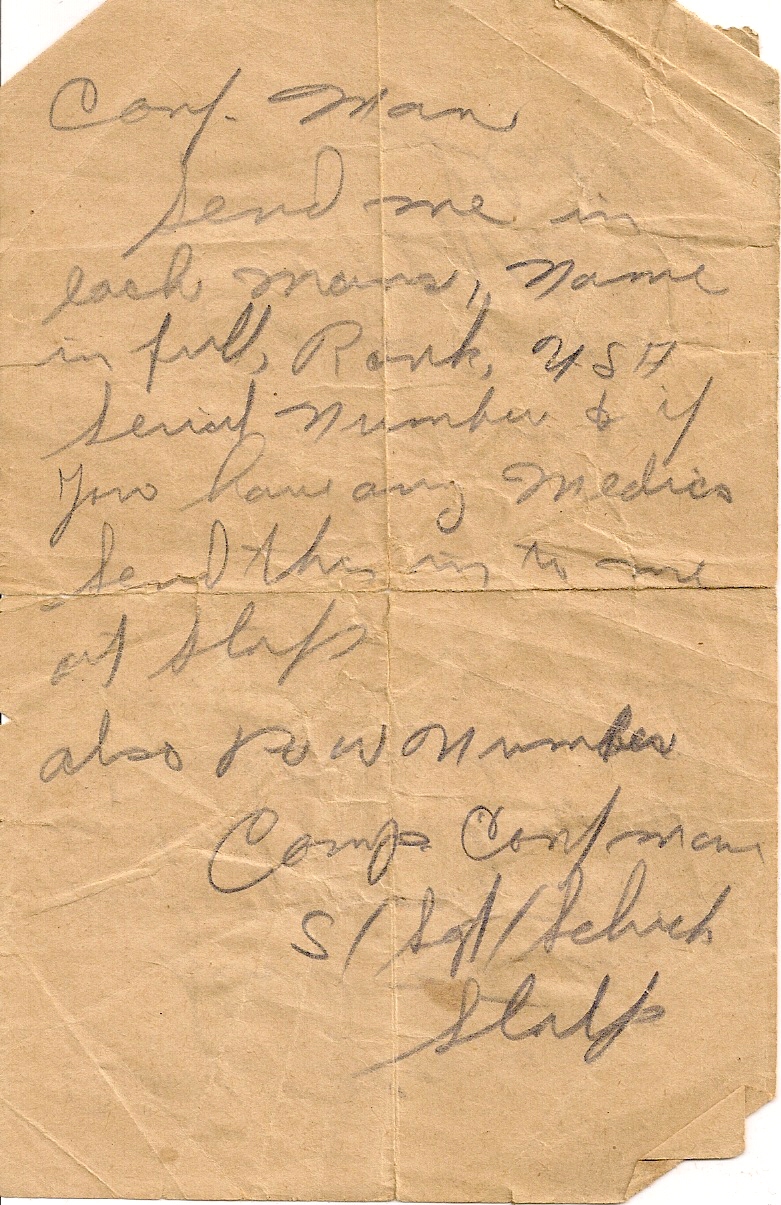
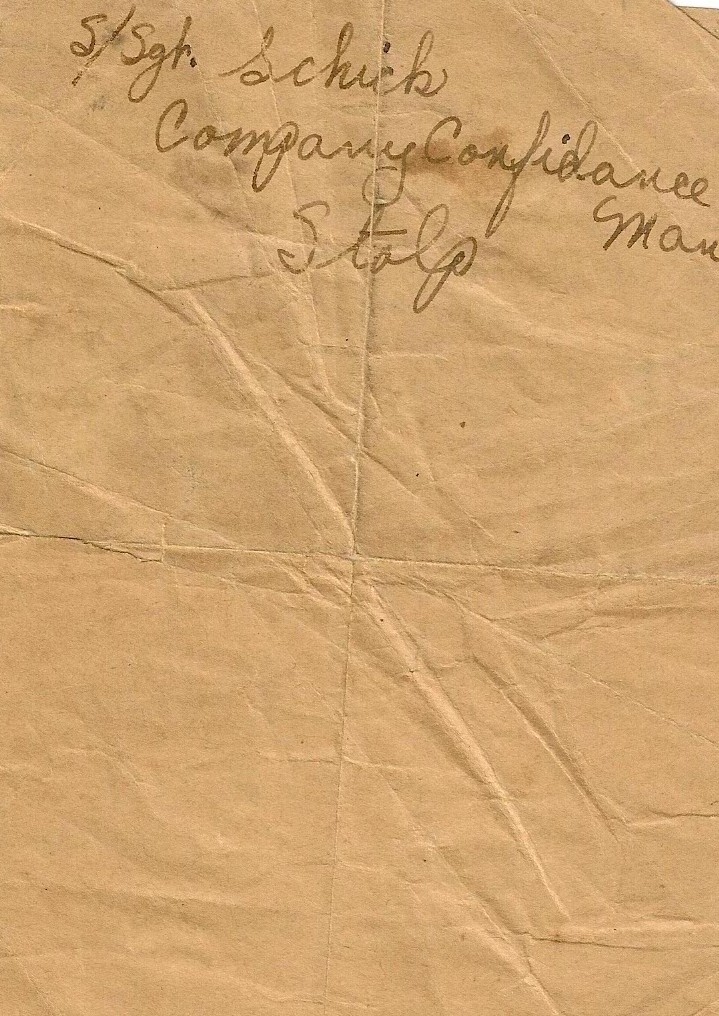
NOTE FROM WOLF: Man of Confidence
Sgt. Jacob G. Schnick represened 40 Kommandos, Company Stolp.

November 5, 1944
Dearest Cass,
Thursday I received a batch of letters from
you, and in one was a photograph of the babies. It sure surprised me to see how much the babies have grown since I went
away and I was overjoyed to see how good they looked. I will keep the photographs of you and the babies next to my heart
as you are all in my heart every moment of the day and always will be for the rest of any life. Friday was Carol’s
birthday, so I hope you gave her an extra hug and kiss for me. I sure hated missing her first birthday and I hope it
will be the last. Pretty soon it will be Kathleens birthday too, so tell her that her daddy loves and miss her terribly.
Everything is alright here sweetheart, so don’t worry about me. Give my regards to Jimmy and Aggie and I hope
they will be happy together. Also give my regards to Richard and his wife and the same to them. I love you sweetheart
and always will.
Carl

Dear Mrs. Hildenbrand November
5, 1944
I am writing on behalf of your Husband to convey to you a photo he had taken while in
the camp. He asked me to do so because he was selected for kammando and was not there to receive them when they arrived. I
got acquainted with him when I arrived in the infirmary,we saw much of time there and i got [illegible]

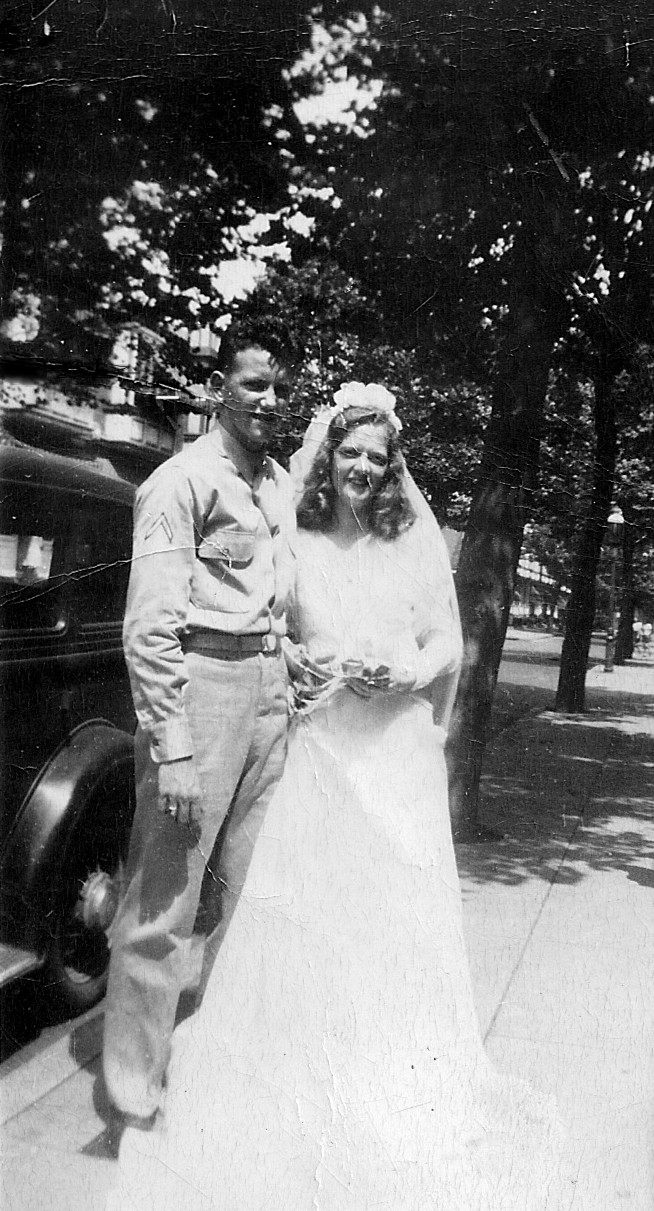
Jimmy and Ages Wedding Photo

November 12, 1944
Dearest Cass,
I received 10 letters from you Thursday
so I’ve got plenty to write about. You said that you were working on weekends. What are you working, day
or night shift? I hope you don’t keep it up too long as the babies need looking after right now and I think you
should be with them at all times. After all, I don’t think you need the money that bad. Do You? I
received a letter from Johnny Fanning so if you see him, tell him that I was asking for him. I also received 3 cartoons
of cigarettes from you and they sure came in handy. I got the babies shoe and I’m sure that it will bring me luck,
like you said it would. I’ve been on the farm 6 weeks now and I’m feeling pretty good. I’m missing
you more every day honey and I’m sure looking forward to the day that I will see you again. I love you terribly
and always will. My love to the babies.
Carl
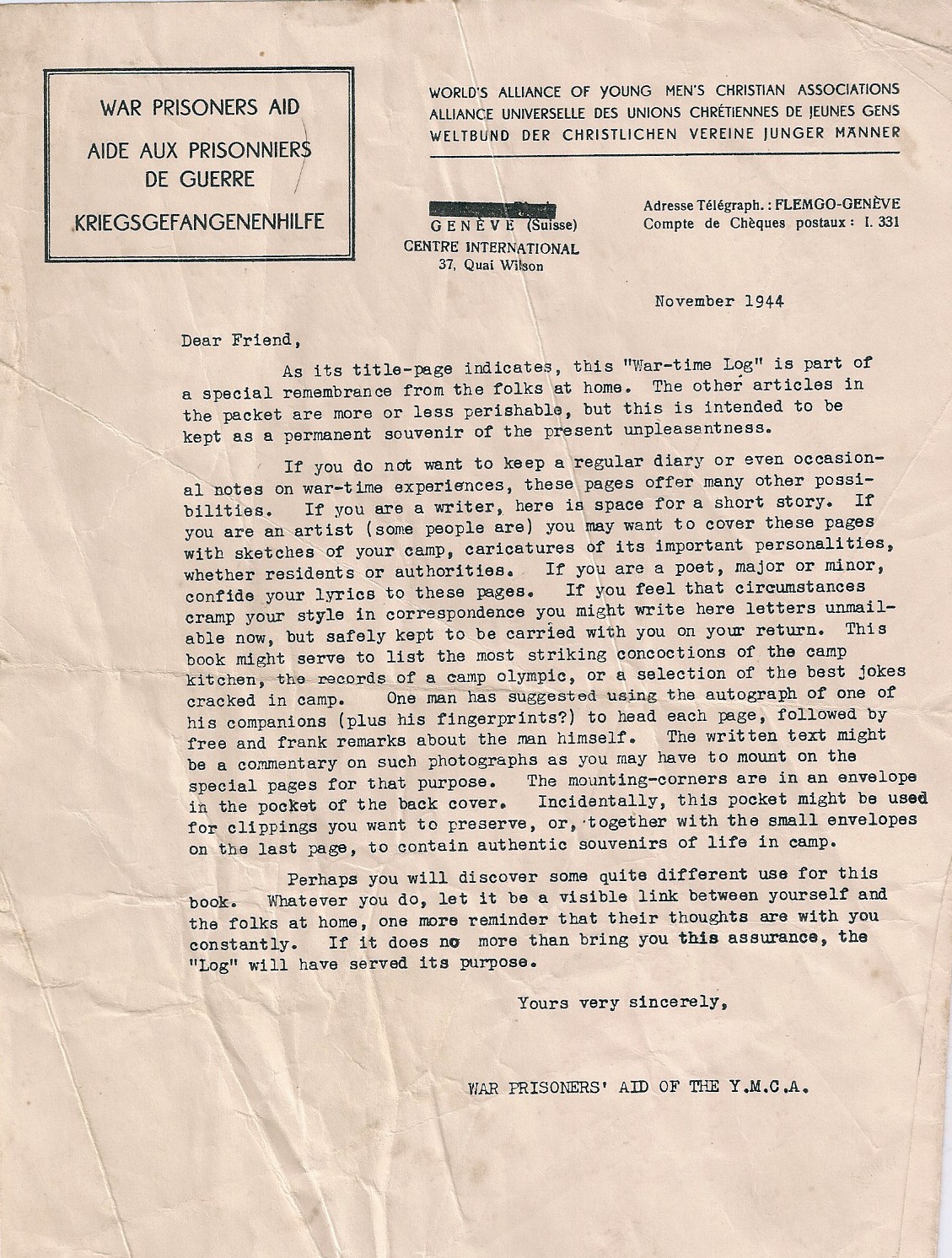

Postcard
November 19, 1944
Dearest Cass,
Received 8 letters from you Thursday and
one from my parents. Are you getting much mail from me? I’m writing every week, so If you don’t get
it, it’s not my fault. In your next parcel that you send, please put lots of candy and also lots of pictures of
yourself.
Love,
Carl

Undated
Estimated November 22, 1944
Dearest Cass
I received 11 letters from you Saturday. Awfully
sorry to hear about Reds Brooks and I hope he's alright I got few _____ that Rudy ____ wrote
and awfully glad that everyone is alright at home. I got the picture I had taken in the Stalag yesterday so I'll send
it on through. It's the fellow's that sent it to me -- he is a buddy of mine and he lives in Philly, his name is
Frank ___ego and he lives at 1631 Jackson St. Tell his folks that he is safe and in the best of health. I was
with him while and as I left for the farm I had him send you the picture--so I can be sure that you got one
of them. There is a fellow in the picture that is also from Philly his name is Frank Trocino 2650 Ader St. Show the picture
to his folks. Take care of yourself and the babies. Honey, as I love you all very much. Tell the folks to
write that I miss everyone.
Love
Carl
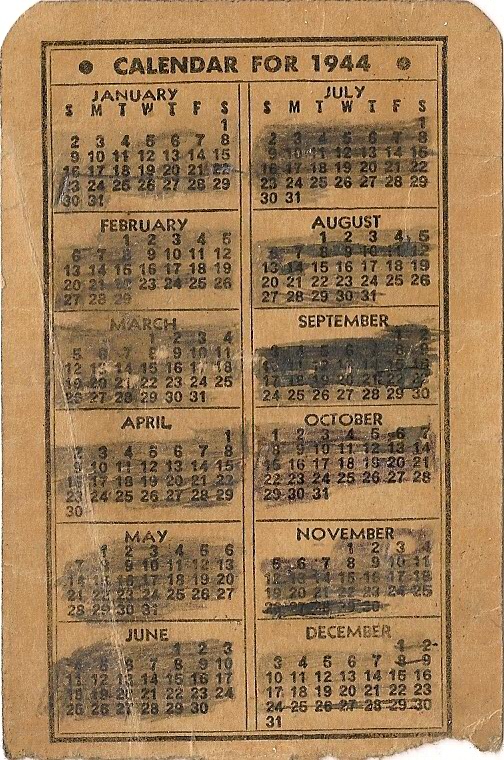
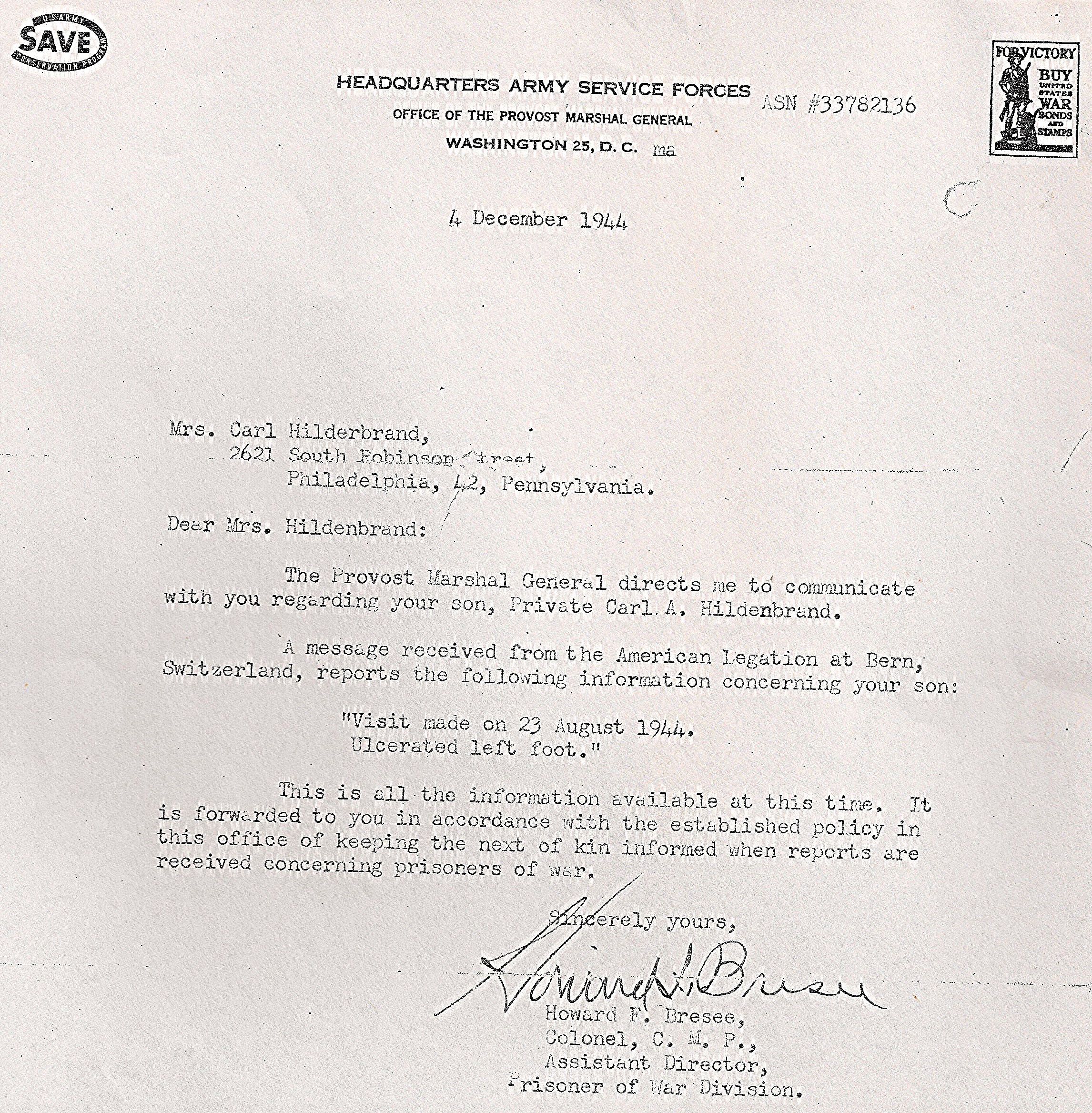
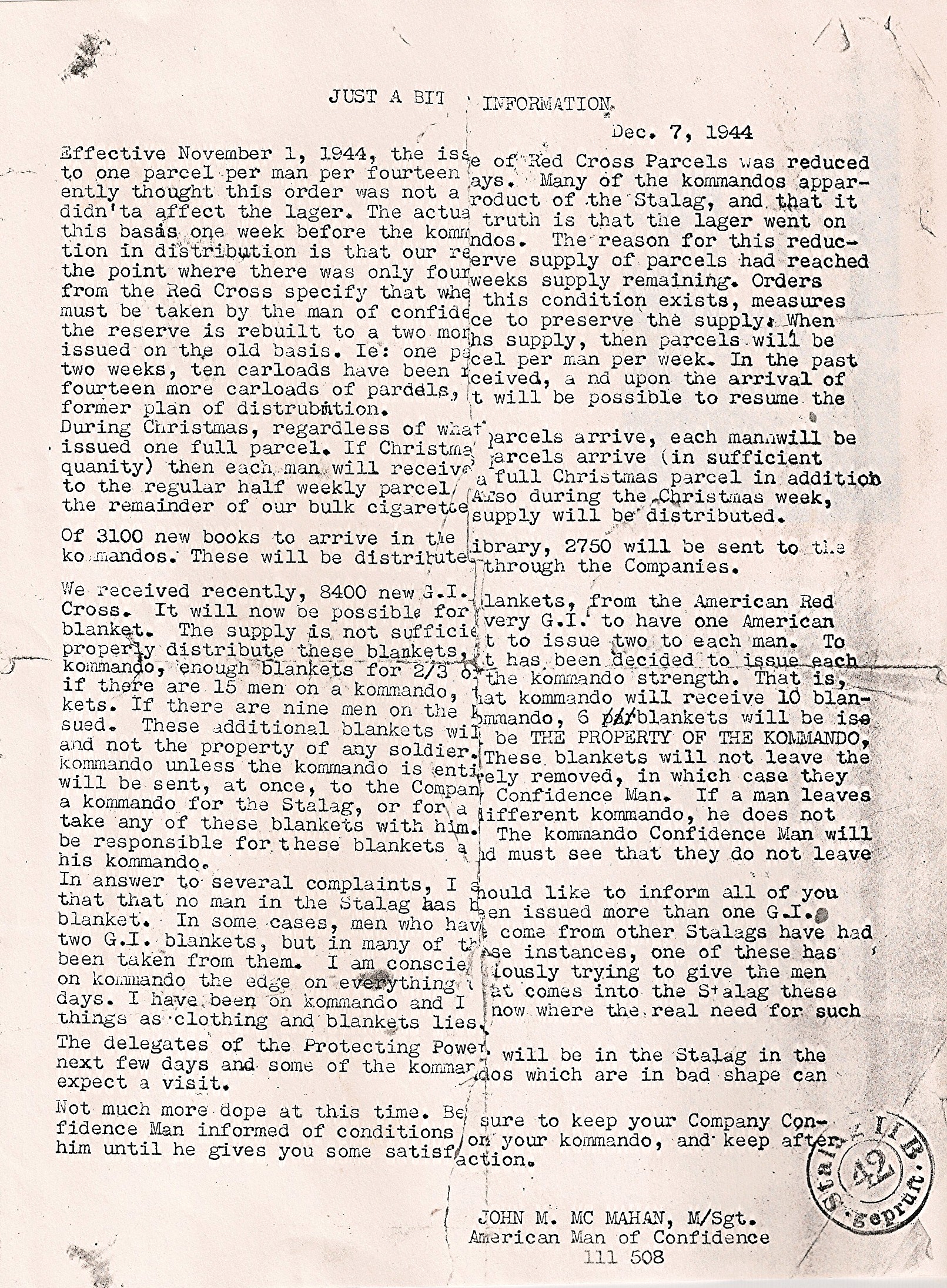
NOTE FROM WOLF: Sgt. McMahan, Camp Confidence Man at Stalag IIB. Read the final report from the U.S. Personnel
on top of page, replacing Pvt.Gallar July 1944. [Germans refused to negotiate with him because they found out he was
Jewish]
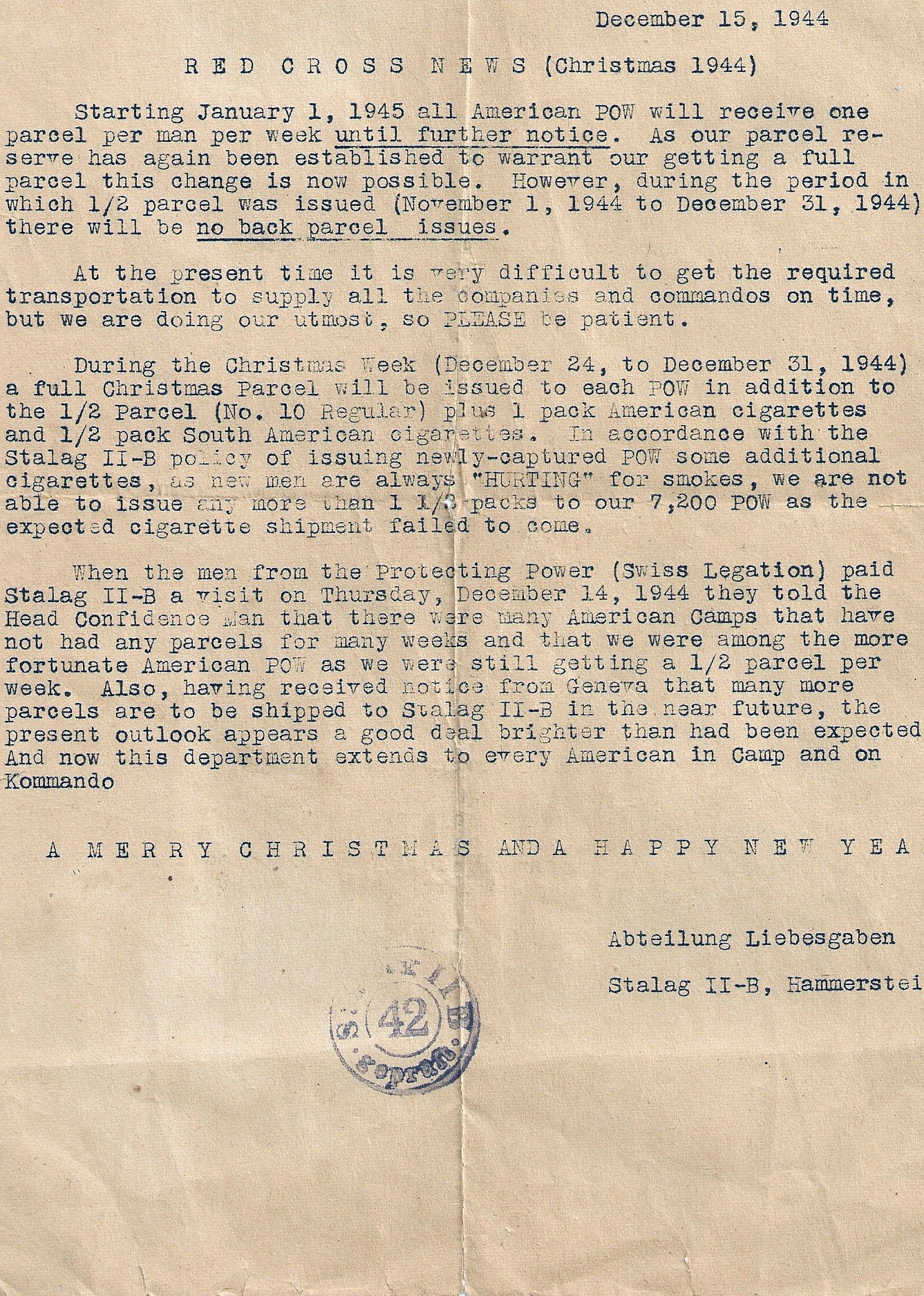

December 15, 1944
My heart cries to hold all of you in my arms. Christmas will be here next week
and we have 2 days off. I don't know what we'll do to celabrate, but I'll let you know in next weeks letter.
Don't forget to write and let me know what you do on xmas, as I am anxious to know. Dont worry about me as everything is fine
and I'm in the best of health. A merry xmas and a happy new year to everyone, especially to you and the babies. Give
the babies a big hug an kiss for me.
Loving Ever
"Carl ''

Dear Cass,
Last week I
received 2 letters + one post card from you . If you had any pictures taken while you were down the shore, I wish you
would send them to me as I would be very happy to see them we had some pictures taken here at the farm --- -- from
you this week --pictures from you and the babies I really look forward getting letters and pictures as they are only
things that I look forward to, day to day. I'm still on the farm and the weather here is getting colder. We've had a few light
snow falls so far, so it looks like were going to have a white xmas, the pictures of the babies and yourself [illegible]

Postcard
January 1, 1945
Dear Sweetheart,
Things are pretty quiet here on the farm
and it has been snowing the past few days. We welcomed the new year in pretty quietly, as we didn’t have any means
of celebrating, but we gave a few bangs on cans anyway. I hope this is the year that I’ve been dreaming about.
Love also,
Carl

January 7, 1945
Dear Sweetheart,
Received 12 letters from you Friday and
was overjoyed in receiving them. In one of your letters you said that you were sending me a parcel for xmas, but as
yet I haven’t received it. You said that the babies were coming along fine and that the doctors out the hospital
praised our baby Carol. Well honey, I sure wished that I was home to see her and Kathleen growing up, as I know that
I’m missing the best years of their life and also ours, but I’ll try and make it all up to you when I come back
home. You also wrote and told me about Larry Clyne being captured the same time as myself, but as yet I haven’t
met up with him, but I’ll let you know as soon as I do. I’m still on the farm and everything is fine, so
don’t worry about me. The only thing that is wrong with me is that I miss you terribly and long to be with you.
Loving you always,
Carl

January 12, 1945
Dear Mrs. Hildenbrand,
I sure was might happy to hear from you as
when you hear from one who has known your loved one even though we are so far apart it seem to bring us so much closer together
and I know how you must feel as I know how I feel about my only son. But I am sure your two children take up your time
and that will help you, I am sure. Well my son is mistaken about the Hildenbrand that I know as the girls I know are
Helen, Catherine and Elizabeth but they live at Palethorp and Ontario Sts, but I also work in the Artloom Corp where a man
by the name of Karl Kellenben works it was he who read my first card from my son for me that is the German printing that was
on and I received a letter from my son about a week before Christmas and I was telling this man and he told me of a card or
something his daughter or someone got from his nephew and that he had mentioned my sons name. But when he was telling
me he didn’t know it was my son as he didn’t know my name was Sauter so he must be related to you or your husband
in some way. So if you answer this letter, I will be more than glad to hear from you on Dec. 18th.
I was notified from Washington that my son was moved from Stalling 2B to Aflag 64 so that mean my son and your husband is
no longer together.
So please write as I sure would be glad to
hear from you.
Sincerely your,
Mrs. Frances Sauter
3421 N. Tioga Street (formerly 211 E. Tioga
Street)

January 14, 1945
Dearest Sweetheart,
I received 6 letters from you Thursday and
they sure make me feel good whenever I receive any. You said that you got the pictures back that you had reprinted the
other day, so I hope you are sending me some of them. Are you? In my previous letters I told you to send lots
of pictures of yourself and the babies, but as yet I have received only a few. Honey if you only knew how much them
pictures meant to me. I’ve been a prisoner a year now and every day of that year I was praying and hoping for
some more pictures. When you get the picture that I sent you of myself you will know the feeling that I get whenever
I receive one, so send me lots of pictures in the future, ok. Still working on the farm and every things ok, so don’t
worry about me. I hope you aren’t planning on me being a farmer when I get back home, are you? I give the
babies all my love and to you especially.
Carl

Postcard
January 21, 1945
Dearest Cass,
Received 5 letters from you and one from
my parents. It feels great to hear from you almost every week and I sure sweat it out every week. You were telling
me that Mildred and Tom were getting married, so congratulate them for me. I miss you honey, and love you terribly.
Carl

WOLF'S NOTE: Picture of unknown German or Polish Boy Dutch met while in Prison Camp
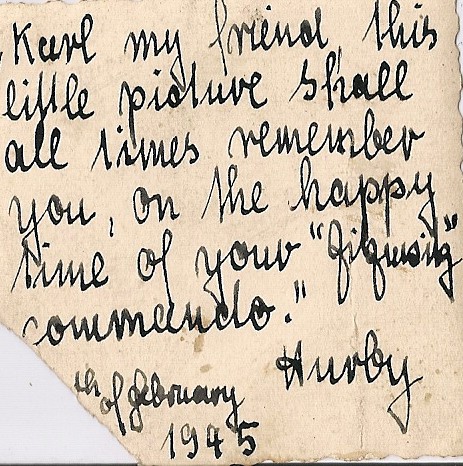
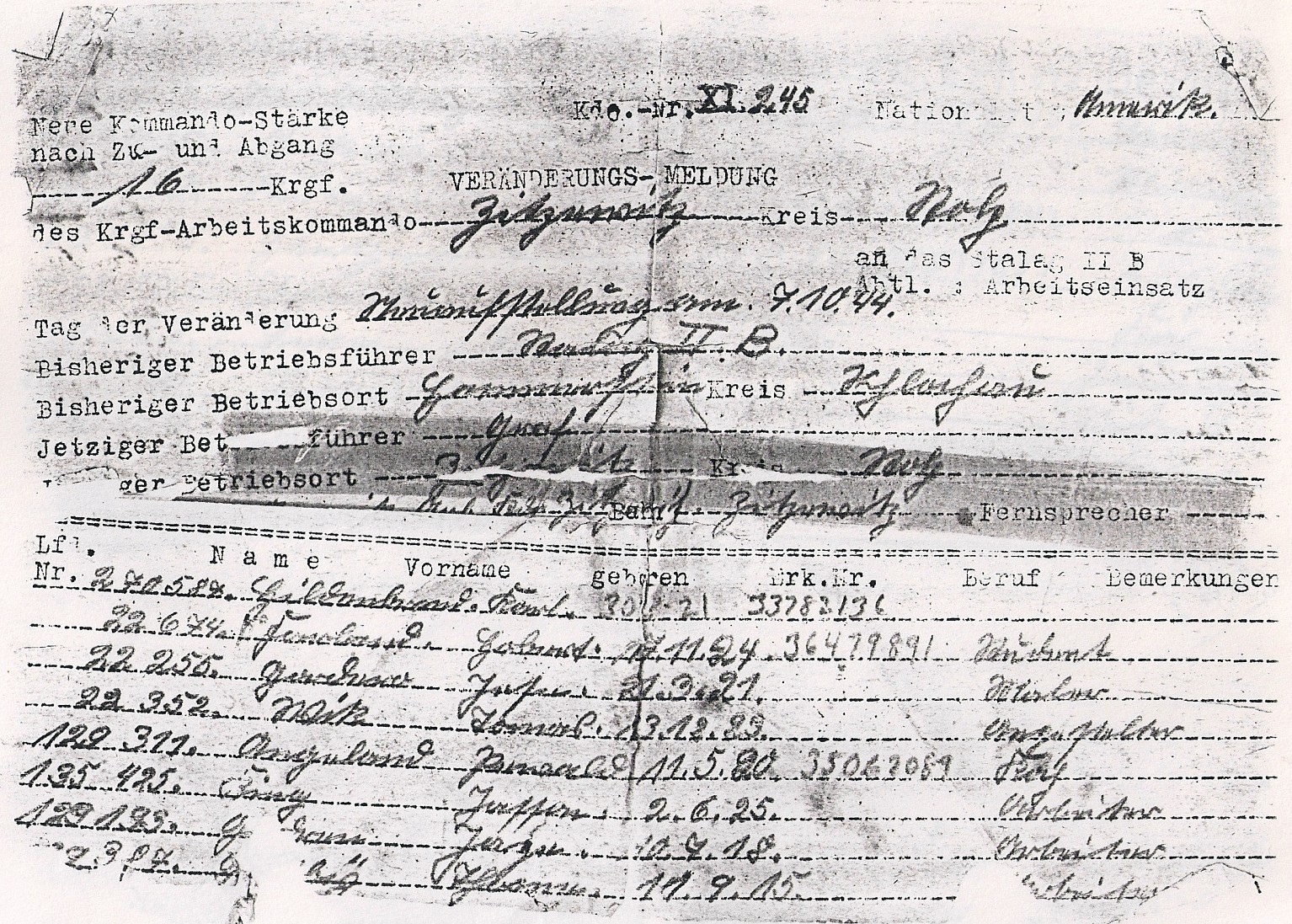
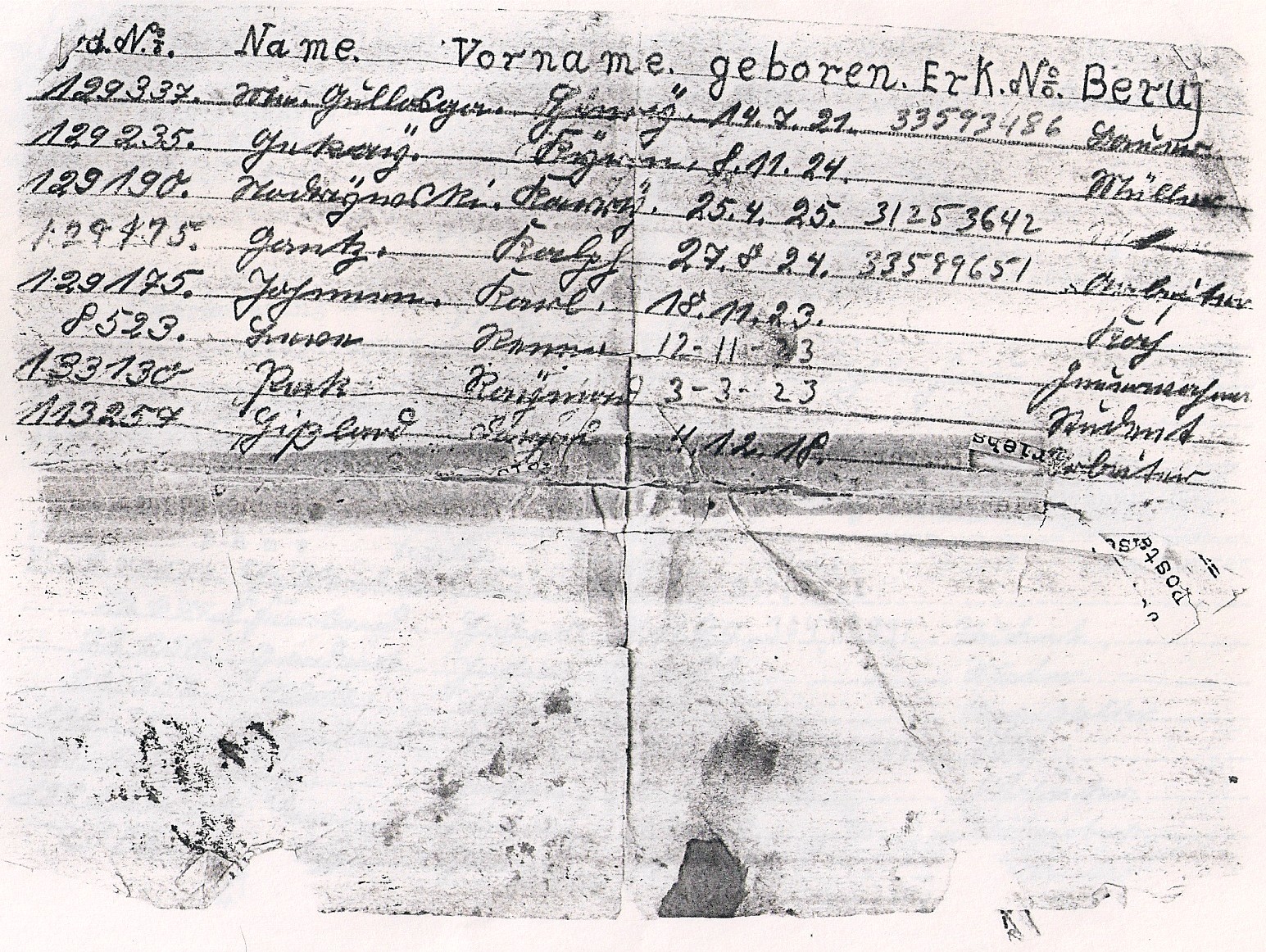
|

